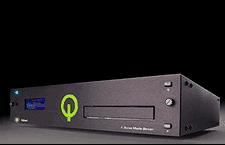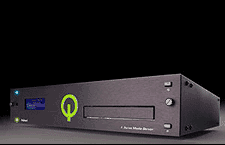


In a world dominated by Steven Jobs and his almighty iPod, far too many AV installers and home integrators simply give-in to the simplicity of using a low-resolution Apple iPod as the audio source in a home automation or home theater system. At 128 kbps, an iPod packs about one quarter of the resolution of a 25-year-old compact disc, which is hardly anything to get excited about. An iPod is pretty special when you are at the gym or on an airplane, but don't you want beamingly beautiful, uncompressed music gracing every corner of your home? Then perhaps you need a ReQuestF-Series music server.
Configurable in terms of hard drive space, this ReQuest F-Series review unit packs a 160GB hard drive and is priced at $5,000. The ReQuest server is a close-ended system, meaning it isn't a home theater PC and therefore isn't susceptible to the viruses and Microsoft-based ills that come with that. The ReQuest F-Series server is also configurable to play over four unique zones, so it is very well-suited as the front end to a home automation system in ways an iPod cannot even dream of. The ReQuest unit is RS-232-controllable, so a Crestron, AMX or Control4 remote and or keypad can be programmed to give you very smooth access to your music. Most importantly, the ReQuest can and should be used to rip full-resolution music when iPods are at a fraction of the resolution. Yes, you can use a Web-based online tool to manage your music, including songs from iTunes, but the real draw of the ReQuest is its resolution.
Sonically, I have tested the ReQuest against some of the best sources in the audiophile market and, while there is a tiny difference between plunking a disc in a $20,000 player and playing it on the ReQuest, I must say I more frequently reach for the old Crestron and search my music collection on the ReQuest. More importantly, the ReQuest, thanks to my Crestron home automation system, allows me to access uncompressed CD-quality music managed into meaningful play lists in ways that an audiophile CD player cannot duplicate. In late 2008, being able to dial in a musical mood and play it in one of four zones in my house is worth a pretty penny. Want Zen-spa music in the gym for a post-workout cool-down session? No problem. Want classical guitar playing gently in the background of your wine cellar? You can have that, too. This is not an iPod - the ReQuest F-Series server is a powerful home automation source component.
Read The High Points and the Conclusion on Page 2
.

High Points
• It takes 12 to 15 minutes to rip a disc and there is no multi-disc transport, so loading your music collection in uncompressed formats can take weeks of your time.
• As opposed to systems like Sonos, there isn't wireless connectivity, satellite radio and/or Internet radio on this level of ReQuest server, despite its significantly higher price.
• There is now an external backup at an additional price and I recommend it for all ReQuest users, both new and legacy. I have lost my music to the point where ReQuest couldn't recover it, which caused me to lose days of my time to reload it all.
• The on-unit and onscreen interface on the machine is not really that strong, so you are forced to use the Web interface which, to be polite, sucks. Want to create a new play list? Well, it ain't iTunes. You can select an artist or a band and then find the somewhat hidden pull-down menu and then create a new play list from there. There is no easy way to batch-upload music from artists or albums to a play list. Where you can drop an entire folder of the music of, say, Prince into your iTunes and it automatically loads, on the ReQuest web interface, you need to manually select each album.
• The metadata quality on the ReQuest is nothing short of terrible. When high-end players like Kaleidescape are manually making sure that each of their clients' systems have correct data, you can expect to see Jimi Hendrix spelled numerous different ways, such as "Jimmy Hendrix," "Jimi Hendrix" and "The Jimi Hendrix Experience," all with different albums associated with each spelling. Feel like you are in a progressive rock mood? The 40-year catalogue of Yes (a three-letter band name, mind you) is listed with both all caps and with a capital Y and lower case "es." Which designation is employed to list the album Tales of Topographic Oceans or 90215 is your guess. ReQuest needs a way to override the metadata program it subscribes to and have a full-time team of people coordinate the data on the CDs that are ripped.
• Let's assume you have a large collection of music that you have on an external hard drive and you want it on your ReQuest. Well, you are out of luck if you use a Mac (I didn't try a PC because there was ZERO chance I was going t reformat a drive with that much valuable music on it). The concept is called convergence, but it is hard to see the parts working together very well at this stage.
• A 160GB hard drive is pretty damn small by today's hard drive standards. For $5,000, a terabyte - if not more - should have been installed.
Conclusion
The ReQuest server is a powerful tool for home automation and for the audiophile who wants a source that can play uncompressed music at the touch of a button or a keypad. Its multi-zone and RS-232 capabilities, along with its close-ended architecture, make it tempting for the installer to use in a large-scale distributed audio system. The ReQuest server, like all convergence components today, does come with its warts. Restarting the unit to get reliable performance is only the beginning of the issues owners will face. I only recommend the F-Series unit with the backup drive, as losing your music when it take this long to load is enough for any reasonable person to say "screw it" and just go with an iPod dock for the theatre and give up on audiophile-grade music altogether, which is a shame. Right now, the ReQuest F-Series music server is one of the better units on the market, but it is on the cutting edge of convergence and therefore comes with some sharp edges that are important to know before you kick down $5,000.